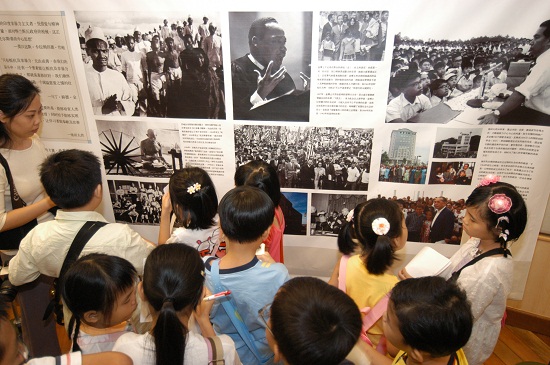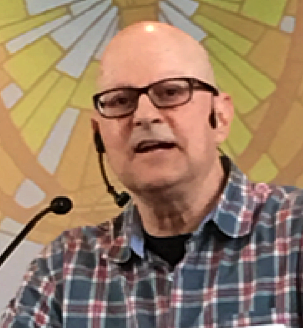My current reading obsession (thanks, Mikki!) during the coronavirus quarantine is the 20-book fictional Marcus Didius Falco detective series. These well-researched stories are set in ancient Rome and make abundantly clear that there has been institutionalized prejudice, discrimination and antagonism for thousands of years. And, the beleaguered – those with the least – usually suffer the most during a pandemic. This disregard for human life will only change when enough people at all levels of society embrace the interconnectedness of all life and recognize that, contrary to what some might believe, real lasting happiness can never be built on the misfortune of others.
Speaking of misfortune, there is no way I can fully grasp the depth of frustration being experienced by people of color at the horrific murder of yet another African American. So what can I, a 70-year-old bald-headed white Jewish Buddhist, do to make a difference in this seemingly hopeless situation?
Well, during this forced stay in my home, I can continue to dig even deeper to root out my own prejudices and, in my own small way, be a voice for peace and tolerance in the spirit of Mohandas K. Gandhi, Martin Luther King Jr. and Daisaku Ikeda. These three men from three different cultures and continents followed a common path of profound dedication and achievement in improving the lives of countless people. For several years, an international traveling exhibit, “Gandhi, King, Ikeda: A Legacy of Building Peace,” has conveyed the pivotal principles of these three spiritual leaders.
“In the moment of our trial and our triumph, let me declare my faith. I believe in loving my enemies.” – Mohandas Karamchand Gandhi
Gandhi led a successful decades-long nonviolent struggle against British rule in India. He became a worldwide example of courageous civil disobedience as a means to accomplish change. This is in contrast to passivity which is merely doing nothing. Gandhi’s “love your enemies” is in total accord with the teachings of both King and Ikeda.
“Darkness cannot drive out darkness; only light can do that. Hate cannot drive out hate; only love can do that.” – Martin Luther King Jr.

In 1959, King traveled to India or “Gandhi’s country.” He repeatedly referred to this experience as having a profound impact on his own philosophy of nonviolence and methods of action which came to symbolize and energize the American civil rights movement.
Having had an embarrassingly racist father, I was drawn in 1969 to the SGI, an ethnically diverse worldwide lay Buddhist organization. The third SGI president, Buddhist scholar Daisaku Ikeda, led the introduction of Nichiren Buddhism from Japan to 192 countries and territories. He wrote, “A great human revolution in just a single individual will help achieve a change in the destiny of a nation and, further, will enable a change in the destiny of humankind.” This sentiment gives me hope that our efforts for peace are never wasted.
Lawrence Edward Carter Sr., an American historian, professor, author and civil rights expert, commissioned the Gandhi, King, Ikeda Institute for Ethics and Reconciliation in 1999. Carter said, “Our capacity to subdue hatred and to overcome violence in the world is first and foremost the effort to do this within our own lives.”
In his book, A Baptist Preacher’s Buddhist Teacher, Carter wrote of the positive impact Daisaku Ikeda continues to have on his life. He also summed up his hope for the human race in this way: “We humans cannot experience peace unless we are free: free of addiction; free of anger or grudge; free of anxiety, hopelessness, fear, or depression; free of victimhood; free from being unforgiving; free from wanting to exact revenge; free from self-deception; free from denial, projection and avoidance. Freedom means being free from self-imposed negative beliefs, from old stories that limit and confine us. When we are free of these things, all of life has the opportunity to manifest as love.”
I’ll keep working on, talking about and voting for this. I hope you do, too!
Stay safe out there!
Other titles by Mike during Covid-19:
Annie Leibovitz and the Coronavirus
Ansel Adams and the Coronavirus
Louise Penny and the Coronavirus
Harry Manx and the Coronavirus
Davy Jones and the Coronavirus
Prince Hamlet and the Coronavirus
Helen Keller and the Coronavirus
Pema Chodron and the Coronavirus

ABOUT MIKE LISAGOR – Mike Lisagor plays harmonica and sings in Good Karma Blues. He has written hundreds of magazine articles and blogs on a variety of business and Buddhist related topics. He is the author of “Romancing the Buddha,” which he adapted into a successful one-man show that he performed at Bainbridge Performing Arts and in Los Angeles and Washington D.C. His nature photographs have appeared in the Boston Globe, Bainbridge Island Magazine, Living Buddhism as well as in several local galleries. His latest graphic art project, “Reimagined Nature”, is in the lobby of New Motion Physical Therapy.